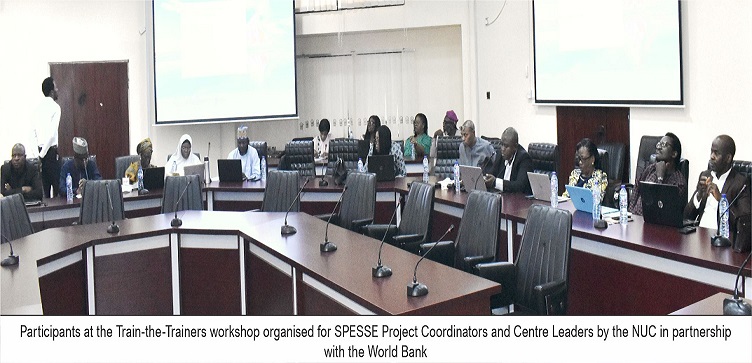
The TTT Workshop was aimed amongst other things, to demonstrate the modus for the delivery of the courses to faculty from the six centres which would be involved in the actual delivery of the course; to determine if the courses were fit-for-purpose within the Nigeria Country context; and to obtain feedback from participants on the structure and content of the course that could facilitate further adaptation for a Nigerian audience.
The Project is funded by the World Bank Supervisory Mission under the SPESSECE for the Coordinators and Centre Leaders, to ensure smooth delivery of the project in the universities.
In a brief remark, the NUC Executive Secretary, Prof. Abubakar Adamu Rasheed, mni, MFR, FNAL, whose address was delivered by a Deputy Director in the Special Projects Office, Mr Peter Tobriese, had reminded the participants that the double tragedy of the Project due to Covid-19 pandemic and the ASUU strike in 2020 had impacted negatively on the SPESSECE Project, but prayed that everyone redoubles his efforts by fast-tracking the processes after the on-going trainings in their own domain to ensure that the timelines are covered judiciously.
In a slide presentation, the Coordinator of Abubakar Tafewa Balewa University (ATBU) Bauchi SPESSE Project, Dr. Suleiman Yusuf Alhaji, titled “Track A Issues on the Sustainable Procurement, Environmental and Social Standards Enhancement (SPESSE) highlighted the impact of the project using the 10 Track A modules.
On the overall implementation of the courses, he said a total number of 36 were enrolled in the Fundamentals of Social Standards; 20 in Understanding Social & Environmental Impact Assessment; 33 in Gender Mainstreaming & Empowerment; 40 persons for Family and Community Health Issues in Resettlement; 34 in Vulnerable Group, Family, Poverty and Inequality; 32 in Labour and Working Conditions Management; 36 in Land Use, Resettlement Planning and Implementation; 33 in Stakeholders Engagement And Information Disclosure; 41 in Management of Non-Resettlement Social Risks as well as 25 persons in Social Financial Intermediation for Sustainability.
He said the programme was designed in a way that candidates who have successfully registered and received the certificate of completion for ten Track A courses can be admitted into the six months version of the Advanced Certificate in Social Standards.
Dr. Yusuf further stated that the course is designed to be delivered in two semesters, that may take period of nine (9) months, while all its Track B candidates would be subjected to assignments, capstone studies, internship, examinations and a project report.
In another presentation by the Federal University of Technology, Owerri (FUTO), the Coordinator, Prof. O.C Okorie, was represented by the Deputy Coordinator, Dr. Mrs Sarah Umeh. She highlighted the expected impact of the 10 modules in Track Course A.
Harping specifically on module one course which centred on Fundamentals of Social Standards, She explained that the contents included; Introduction to Sustainability and Development; Knowledge of Indigenous Social-Cultural Context; The Socio-Cultural Factors in Nigeria that affect Development; Socio-Economic Structure and Social Problems; The Acceptable Social Norms, Beliefs and Expectations; Traditional institutions in Nigeria and Values of Nigerian Communities; Nigeria’s Gross Domestic Product (GDP), Country Partnership Framework (CPF) and World Bank Support; World Bank Environmental Social Framework (ESF) and Environmental Social Standards (ESS); Overview of Social Sustainability and Inclusion; Community Driven Development Projects; Pillars and Principles of Sustainability; and Commitment of World Bank and its Subsidiaries.
The Objectives, according to her include:
a. To understand the socio-cultural and socio-economic structures in Nigeria
b. To understand the core tenets of sustainability, its characteristics and rules of social development
c. To understand World Bank Environmental Social Framework (ESF) and World Bank Environmental Social Standards (ESS)
d. To gain in-depth knowledge on the principles and pillars of Social sustainability
e. To understand the commitment of World Bank and its subsidiaries.
On its learning outcome, the Coordinator stated that the participants were expected to, at the end, be able to: Have the basic knowledge of sustainable development, Have the knowledge of Nigeria socio- cultural and socio-economic structures, Have the basic knowledge of the Environmental Social Framework (ESF) and Environmental Social Standards (ESS), Understand the pillars and principles of social sustainability and Have the knowledge about the World Bank group or subsidiaries as well as the roles and responsibilities of the World Bank and borrower entity in the various phases of the project management cycle.
Other presentations made at the workshop were those by the Coordinators of the Joseph Tarka University of Agriculture, JOSTUA Makurdi, formerly Federal University of Agriculture Markurdi (FUAM); University of Benin (UNIBEN) and the University of Lagos (UNILAG).
